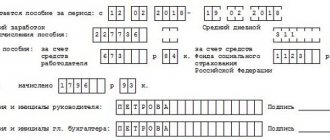In what situations does salary reduction most often occur?
Employee salaries may decrease due to both internal and external reasons.
Internal ones most often include financial problems of an enterprise caused by production difficulties - interruptions in the production of goods, a decrease in its volume, quality, etc. as well as ineffective management or unsuccessful reorganization of the company.
External reasons - loss of established contacts with suppliers of raw materials or distributors of finished products, also leading to a budget deficit for the company, changes in legislation, etc.
Regardless of the circumstances under which the administration decides to reduce wages, it must adhere to a certain procedure in this matter, which includes mandatory written notification to staff.
Changes to the wage regulations
Issues of settlements with personnel are regulated not only by employment contracts, but also by local regulations of the enterprise. In this case, the nuances of wage calculation are displayed in detail in the instructions or regulations on remuneration, which the employee is introduced to before signing the employment contract.
The convenience of the provision is, first of all, that there is no need to spell out everything in the employment contract every time; it is enough to make references to the clauses of the main document. This saves time and resources. For example, it was necessary to rework the remuneration system by introducing new (or eliminating existing) criteria of efficiency, effectiveness, complexity, tension, or something else. The wording can be voluminous and include formulas, calculations, presentation procedures, etc. Writing this every time in each employee’s employment contract may not be entirely convenient: there is a lot of paper, and you can make mistakes if you retype it every time. And if you simply refer to the new point of the provision, then this saves both effort and nerves and minimizes possible errors.
It’s another matter when the question arises of how to formalize changes to the payment regulations. In this case, the administration makes an order to change the wage regulations. Is it necessary to warn employees about the amendments being made? Of course, because this issue is an essential condition of the employment contract.
How to make changes to your organization's benefit regulations
For example, salary payment dates change. In this case, an order is drawn up in free form, in which the following must be stated:
- basis (what caused the changes);
- timing (when the new rules come into force);
- instructions to responsible persons for delivering notifications to employees about upcoming changes;
- who will be responsible for carrying out the order itself.
When to notify
Employees whose salary is being reduced must be notified of this at least two months before the change comes into force.
It is believed that this time is enough for the employee to decide whether to remain in the same place, but under new, less favorable working conditions, or look for another job.
At the same time, in the notification, the employer is obliged to offer the employee all available alternative available vacancies that correspond to his level of qualifications (in case he wants to remain in the company, but when moving to another position). If there are no such vacancies, this must also be noted in the notification.
If the employee nevertheless decides to quit (and such an option when the salary is reduced is by no means uncommon), then in addition to the money actually earned by him at the time of dismissal, he is entitled to compensation for unrealized vacation and payment of severance pay in the amount of average earnings for two weeks.
In the case where a person agrees to a salary reduction and does not want to change employer, an order must be issued to reduce the salary, then the necessary changes should be made to the staffing table and the employment contract previously concluded with the employee, drawing up an additional agreement to it.
How to formalize a change in official salary
Where to begin?
As a rule, an employee’s immediate supervisor asks for an increase in salary. He draws up a memo (sample on page 39.). As for reducing the official salary, the desire of the line manager is not taken into account. The salary amount can be reduced only for reasons related to changes in organizational or technological working conditions (Article 74 of the Labor Code of the Russian Federation). These could be changes in equipment and production technology, improvement of jobs based on their certification, structural reorganization of production. The main thing is that the employee’s position does not worsen in comparison with the terms of the collective agreement or agreement*. Otherwise, if the employee goes to court, the change in salary will be declared illegal.
Example
Nadezhda K. worked as a foreman in conveyor shop No. 3 at . After a complete modernization of the workshop and replacement of old technical equipment with new ones, Nadezhda’s work became much easier. Now she did not need to manually set up the conveyor belt and constantly monitor its performance. These functions were performed by automata. In connection with these circumstances, the plant management decided to reduce the foreman’s salary by 1,500 rubles.
Preparatory stage
Based on the memo, an order to amend the staffing table (sample on page 40), which notes how the salary changes: increases or decreases.
Speaking about increasing and decreasing an employee’s official salary, we must not forget that the terms of remuneration (including official salary) are mandatory conditions of the employment contract (Article 57 of the Labor Code of the Russian Federation). If it is necessary to change a mandatory condition of the contract, the employee and employer must enter into an additional agreement (sample on page 41).
The process of salary reduction should be examined in more detail. The employee should be notified in writing of an upcoming unilateral change to a mandatory condition of the employment contract no later than two months in advance (Article 74 of the Labor Code of the Russian Federation). This is the general rule. There are two exceptions to this. For an individual employer, the threshold is set at 14 calendar days (Article 306 of the Labor Code of the Russian Federation). A religious organization is given 7 calendar days to do this (Article 344 of the Labor Code of the Russian Federation).
The employee is given a notice , which he receives against signature (sample on page 42). If an employee does not agree to work under the new conditions, the employer is obliged to offer him another job in writing. This can be either a vacant position or work corresponding to the employee’s qualifications, or a vacant lower position or lower-paid work that the employee can perform taking into account his state of health (Article 74 of the Labor Code of the Russian Federation). To do this, the employee is given a list of suitable vacancies (indicating the amounts of official salaries) against signature.
It is noteworthy that the employer must offer the employee the vacancies available to him in the given locality (that is, the localities within the administrative-territorial boundaries of the relevant locality). It is necessary to offer vacant positions in other localities only if this is provided for by a collective agreement, agreements, or employment contract (Article 74 of the Labor Code of the Russian Federation). If, as a result, the employee refuses the offered job or there is no suitable job in the organization, the employment contract is terminated on the basis of clause 7 of part one of Art. 77 of the Labor Code (sample dismissal order - on page 43).
If, in the event of a reduction in wages, notification of the employee in advance is necessary, then a natural question arises. Is it necessary to warn the employee if the salary increases? Let us turn again to Article 74 of the Labor Code. When reading its first part literally, it becomes clear that it regulates relations regarding the reduction of official salary: in the case when, for reasons related to changes in organizational or technological working conditions, the terms of the employment contract determined by the parties cannot be maintained , their change is allowed at the initiative of the employer , with the exception of changes in the employee’s labor function.
Therefore, a different rule applies to increasing official salary. It can become larger at any time by agreement of the parties to the employment contract. There is no need to wait two months and no notifications are needed (Article 72 of the Labor Code of the Russian Federation).
Preparing a key order
So, an additional agreement to the employment contract on changing the official salary was signed. Next, you need to prepare an order. The difficulty is that there is no unified form** for this case. Therefore, the order is drawn up in free form (sample on page 44). This order completes the process of changing the employee’s official salary. Next, the personnel officer familiarizes the employee with the order, gives a copy of it to the accounting department to calculate wages, files the necessary documents in his personal file, etc.
https://youtu.be/KwCXSqHJ1yU
General points regarding notification
If you are faced with the task of generating a notice of salary change, and you do not have a very clear idea of how exactly to do this, we recommend that you use the tips below and study an example document.
Before proceeding to a detailed description of the notification, let's say a few words about what applies to all documents of this kind.
Let's start with the fact that the notification can be written in any form - today there is no legally established unified sample. If the enterprise has its own developed and approved document template, then by its type. In any case, it is recommended that the format of the notification be specified in the local acts of the organization (the labor inspectorate may inquire about this issue in the event of an inspection of the organization).
The notification can be drawn up on company letterhead (again, if such a condition is specified in the accounting policy) or on a simple blank sheet of paper of any suitable format (usually A4 or A5 is used). You can write it manually or type it on a computer and then print it out - both options are completely legal.
The notice must be signed either by the head of the company or by a person acting on his behalf (for example, the head/HR specialist or accountant).
If an organization uses a seal to endorse papers, the form must be stamped.
It is better to make the notification in two identical copies . One must be given to the employee, the second must be left in the organization (after having previously secured the signature of the employee on receipt of a copy). Information about the notification should be entered in a special accounting journal.
When necessary
It is important to understand that notification to an employee is a mandatory document when making adjustments to wages. Thus, only when the organizational basis of the enterprise’s activities or the technological process of labor changes, the manager has the right to adjust the employee’s salary downwards.
To do this, you must first provide your subordinate with a notice of changes in wages (a sample for 2020 will be later in the article). Such a document is drawn up in free form. It aims to achieve agreement on both sides.
Sample notice of salary change
The notification has a completely normal structure and is not that difficult to make.
At the beginning of the document (right or left - it doesn’t matter) it is indicated:
- addressee: position and full name of the employee;
- assigned outgoing document number;
- date of compilation and locality in which the company is registered.
After this, the actual message is written. In the main part of the document you need to indicate:
- name of company;
- the reason for the salary change (if possible);
- the previous salary and the new one (all in numbers and in words);
- the employee’s rights under the law (for example, that he can try to reach an agreement with the employer on a different salary) and the consequences of his decisions (up to and including dismissal if he refuses to work under the new conditions).
Finally, the notification is signed by the responsible employee and handed over to its destination.
Why notification is required
The procedure for remuneration (salary, additional payments, allowances) is an essential condition of the employment contract, therefore changing it without first notifying the employee and obtaining consent is unacceptable. It is necessary to inform the employee about upcoming transformations in order to:
- find out whether he is ready to work in new conditions;
- comply with the procedure established by Art. 74 Labor Code of the Russian Federation;
- document the employee’s consent or disagreement to work under new conditions.
Before sending a notification, it is necessary to make changes to the wage regulations or to another document that establishes the system for making payments in the organization.
Read more: how to develop a salary regulation in an organization
Read more: how to make changes to the wage system
Notice periods
The Labor Code contains information on the timing of notification of changes in the essential terms of the employment contract.
- If the organization will notify, then the deadline is no later than 2 months before the implementation of the adjustments.
- The manager is a citizen - no later than 2 weeks.
- If the organization is of a religious nature, staff will need to be informed 1 week before the introduction of innovations.
A notification is a paper that must be completed by an employee of the HR department. The timing in any case depends on the specific case.
What you need to know
According to the current version of the Labor Code of the Russian Federation, one of the employer’s responsibilities is to pay an officially employed employee.
This payment refers to monetary compensation for work performed. The amount of this amount is always influenced by the following important factors:
- employee qualifications;
- quantity, quality and complexity of work performed;
- conditions for its implementation;
- additional payments - incentives, compensation.
The question of various additional payments is discussed in sufficient detail in Article No. 129 of the Labor Code of the Russian Federation.
| Labor resource assessment | Who are in any way involved in the implementation of a certain process |
| Denoted in monetary terms | Any part of the total product of labor |
| A certain part of the costs | For the sale and manufacture of the product |
The legislation covers the issue under consideration in sufficient detail. Moreover, according to the Constitution of the Russian Federation, a Russian citizen cannot receive less than a certain amount.
It is designated as the minimum wage - the minimum wage. Salaries come in different types.
| Paying an employee for time spent | — |
| Payment at all possible piece rates | Salaries/bonuses/other |
| All possible additional compensations | For harmfulness, night and other |
Real wages mean any amount of services or even goods that can be purchased with the amount received from the employer.
In fact, real wage refers to the purchasing power of the worker. In fact, this indicator is the most important.
Since the quality and standard of living of ordinary workers directly depends on it. Purchasing power is defined as the ratio of nominal wages to average consumer prices.
All fundamental points are reflected in the wage regulations. They are enshrined at the legislative level. The employer must comply with all the requirements of the main NAPs.
It should be remembered that delay in payment of wages may result in not only administrative, but also criminal liability.
The employer needs to be aware of this important fact. Compliance with delivery deadlines is strictly necessary. Even if the date falls on a weekend.
The terms of remuneration are necessarily specified in a special document - an employment contract.
It lists the following important points:
- salary level and all related factors;
- date of its payment.
According to the current NAPs on this matter, the employer is obliged to transfer wages to his employee at least 2 times within 1 month.
Violating this rule is not allowed. The date of accrual is indicated in the employment contract.
According to Article No. 57 of the Labor Code of the Russian Federation, it is mandatory to include the terms of remuneration in any employment contract - regardless of its type (fixed-term, temporary, other).
This section must necessarily include the following sections:
- the amount of salary or tariff rate - depending on the chosen remuneration system;
- incentive payments - compensations and others;
- allowances, surcharges;
- night work/overtime performance of job duties/other deviations from the normal work schedule (work on weekends);
- place, terms of payment of wages.
The section on remuneration for citizens of the Russian Federation is one of the most important in the Labor Code of the Russian Federation. This is Chapter No. 21 of this regulatory document.
We suggest you read: Liquidation of an organization with debts
| Article No. 133 of the Labor Code of the Russian Federation | It is allowed to use the minimum wage on the territory of the Russian Federation |
| Article No. 133.1 of the Labor Code of the Russian Federation | Taking into account what the minimum wage value is formed |
| Article No. 134 of the Labor Code of the Russian Federation | The amount of mandatory indexation of wages is established (its increase taking into account inflation and other factors) |
| Article No. 135 of the Labor Code of the Russian Federation | What internal NAPs are used to determine the amount of wages at the enterprise? |
| Article No. 136 of the Labor Code of the Russian Federation | The place, order of transfer, as well as the date of receipt of wages are indicated |
Art. No. 138 of the Labor Code of the Russian Federation - the limits of deductions are listed (such actions are allowed only in special cases). Article No. 139 of the Labor Code of the Russian Federation is a formula for calculating the average salary.
Art. No. 140 of the Labor Code of the Russian Federation - when settlement payments must be transferred in the event of termination of the employment agreement. Article No. 141 of the Labor Code of the Russian Federation - how payment is issued in the event of the death of an employee.
Art. No. 142 of the Labor Code of the Russian Federation – employer’s liability in case of late payment. Article No. 143 of the Labor Code of the Russian Federation – application of tariffs when calculating wages.
Art. No. 146 of the Labor Code of the Russian Federation - salary when performing official duties under special conditions. Article No. 147 of the Labor Code of the Russian Federation - how remuneration is carried out for employees working in hazardous conditions harmful to health.
Also, the issue of remuneration is covered in sufficient detail in federal legislation. It is imperative to comply with all legislation.
Otherwise, you may come under close attention not only from the labor inspectorate (Rostrud), but also from the Federal Tax Service. Since the employer is always the tax agent of his employee.
Violations of legislation in this area can lead not only to fines, but also to deprivation of the right to engage in a certain type of activity.
Sometimes, when working part-time or full-time, it becomes necessary to change the amount of wages.
But it should be remembered that this requires compliance with two important factors:
- availability of the employee’s consent;
- no violations of current legislation.
| A bilateral agreement is being drawn up | Between the employee and the employer |
| It is being signed | — |
| A special order is issued to increase wages | Which must be approved by the signature of the responsible person (executive director, other) |
There is no unified form of the document of this type in the legislation in force on this matter.
Therefore, it can be compiled in free form. But at the same time, it is also strictly necessary to comply with the legal documents regulating this moment.
It is necessary for the personnel employee to formulate both the agreement on changing wages and the order.
In this way, it will be possible to avoid making the most common mistakes. An example of such a document can be easily found on the Internet.
In some particularly complex cases, it is advisable to consult with a qualified lawyer. Especially when it comes to downward changes in wages.
If the employment contract includes conditions for changing wages unilaterally, without the consent of the employee, then this procedure can only be carried out if there is appropriate notice.
Compliance with this rule is strictly mandatory. If it is not fulfilled, the employee has the legal right to appeal the employer’s action through the court.
Document structure
Drawing up an order for remuneration is a simple procedure, but it has its own nuances.
There is no standard for this document in the legislation, but it is necessary to indicate the following points:
- full name of the employing institution;
- order number and date of its preparation;
- reference to an internal regulatory act or legislative norm;
- designation full name responsible persons, as well as employees whose wages will be changed;
- signature of the director or other responsible person;
- company seal.
The reference to the current legislative norm should be reflected as accurately as possible.
Since such an action can only be carried out if there is an appropriate regulatory document. Reducing wages without any reason is not allowed.
: change or get out
Such an action on the part of the employer is punishable. It may lead to litigation.
It should be remembered that the Labor Code of the Russian Federation was originally drawn up to protect the rights of ordinary workers. Since the employer is initially in a more advantageous position.
That is why in most cases, if a violation of the rights of an ordinary employee actually occurs, the court is completely on the side of the plaintiff. But there are many different important nuances.
Another very important factor is the establishment of a minimum wage for an employee. This point is covered in maximum detail in Article No. 133 of the Labor Code of the Russian Federation.
| The minimum wage is always set uniformly throughout the Russian Federation | But at the same time it can be changed upward by regional legislation |
| Salary of one employee | For a month there cannot be less than the minimum wage specified in federal legislation |
| Private enterprises | Must provide the established minimum wage from their own funds (municipal - from the state budget) |
But often the employer resorts to various kinds of tricks in order not to pay wages to its employees in the amount established by the Labor Code of the Russian Federation.
What you need to know
Salary reduction at the initiative of the employer in 2020
will be 30,000 rubles. The bonus to the official salary provided for by the regulations on remuneration dated March 12, 2009, remains in the amount established by the staffing table approved by order of the General Director dated December 29, 2009 N 47, and amounts to 10,000 rubles.
You can confirm your consent to the change in official salary with your personal signature at the end of this letter. Please also inform the HR specialist about your decision.
At Medtechnika LLC there is currently a vacancy for the position of senior specialist in the procurement department (base salary 35,000 rubles), to which you can be transferred. Please inform the HR specialist of your consent to the transfer.
We notify you that in the event of your refusal to change the employment contract and the proposed transfer, your dismissal will occur after two months from the date of delivery of this notice - December 22, 2010 - on the basis of clause 7, part 1, art. 77 of the Labor Code of the Russian Federation.
General Director Trofimov K.Yu. Trofimov A notice of salary reduction and an offer to transfer to another job was handed to me. —————————————————————————— (employee’s note of agreement or disagreement with the transfer to the proposed positions) (employee’s signature) (signature transcript) Date
Comments:
Changes in an employee's remuneration must be properly documented. The employee must be notified of upcoming adjustments in writing against signature.
When can the salary be reduced?
If the employer’s organizational or technological working conditions have changed and the terms of the employment contract determined by the parties cannot be maintained, labor legislation gives the employer the right to change them, in particular to reduce the salary (Article 74 of the Labor Code of the Russian Federation). It is not allowed to reduce the salary if the employer unilaterally changes the employee’s labor function for other reasons. For example, it is impossible to reduce the salary if the organizational or technological working conditions have not changed, and the employer simply decided to reduce the scope of requirements for the employee by adjusting his job description.
Changes in organizational or technological working conditions involve changes in production equipment and technology, structural reorganization of production and other similar reasons. The fact of such changes must be documented in writing in the form of a decision or order to change working conditions.
If the employee does not agree to a reduction
The most likely case is when the employee does not agree to work in his old position for a lower salary.
In this case, the employer is obliged to offer him in writing another job available to him. In this case, all vacant positions or jobs corresponding to the employee’s qualifications, as well as a vacant lower-level position or lower-paid job, must be offered.
This is interesting: Sample equipment repair contract
If the employer does not have an alternative job or the employee refuses the proposed options, the employment contract with such employees is terminated in accordance with clause 7 of part one of Art. 77 Labor Code of the Russian Federation. Moreover, in addition to actual earnings at the time of dismissal, as well as compensation for unused vacations, such an employee is entitled to severance pay in the amount of two weeks’ average earnings (Article 178 of the Labor Code of the Russian Federation).
If there is no agreement
After receiving the notice, the employee either agrees to the new terms or not.
Changes are made to the employment contract and additional agreements by authorized persons only with the consent of the worker himself. If such approval is not forthcoming, then the employee is offered other jobs in the organization as part of the changes. The workplace must necessarily correspond to the qualifications and level of training of the citizen.
If there is no suitable free position for the worker or he refuses to move to another job, then he is fired for the following reasons:
- At your own request.
- Due to the refusal of the proposed vacancies.
Upon dismissal, the employer is obliged to pay the citizen wages, taking into account unused vacation and severance pay.
Can an employer reduce salary unilaterally?
- as an alternative, offer existing vacancies that would suit their level of competence;
- and in the absence of such jobs, you should be informed about available positions for which a lower salary is due.
When an employee rejects all the proposed options, the only option left is to fire him. An entry in the work book is made with reference to clause 7 of part 1 of article 77 of the Labor Code of the Russian Federation. For more details, see “Rules for filling out and maintaining a work book.” Reducing working hours To reduce your wage fund costs by reducing your salary at the initiative of the employer, he can use another option - to establish a part-time working schedule at the enterprise. For example, if an organization has a 6-day work week, the number of working days can be reduced to 5 or 4.










